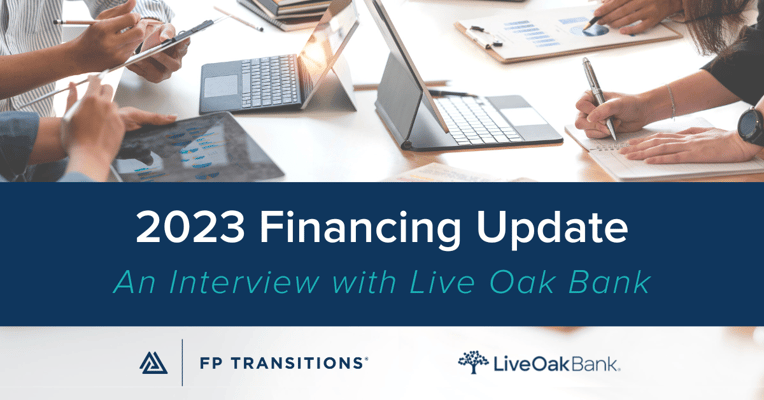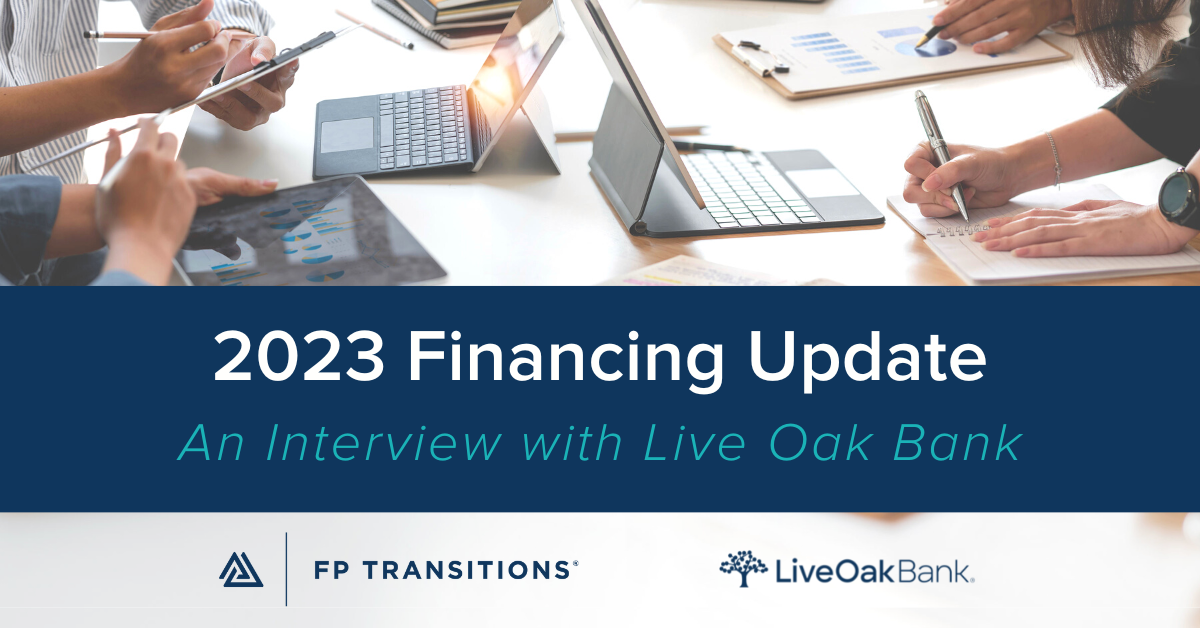Blog
2023 Financing Update - An Interview with Live Oak Bank

We’re coming off an incredible year from mergers and acquisitions yet again. In fact, we closed out 2022 as one of our greatest ever for FP Transitions, and the same goes for Live Oak Bank. We took a moment to reconnect with James Hughes, SVP of Advisory Lending for Live Oak Bank, to break down the key areas advisors should consider before they enter the 2023 mergers and acquisitions environment.

Jess Flynn: I'm here with James Hughes from Live Oak Bank to answer some of our clients’ pressing questions around the M&A marketplace right now.
Some of the things that we're predicting for 2023 include: market volatility, rising interest rates, and difficulty of buying-in for the next generation (for those looking to build those multi-generational businesses) plus increased interest in the Sell and StayTM opportunities.
So, James, how long does the financing process start to finish typically take for an acquisition?
James Hughes: Jess, thank you and I appreciate you having me on. It's a pretty simple answer. Our process is 45 to 60 days from the time that you complete the application to the time that we fund. I do like to have people reach out to us early in the process so that we can get out in front of structural questions or any potential issues that might be within the buyer or the seller or the deal structure. So, there's no bad time to reach out to us. I would say the earlier, the better.
Jess Flynn: When you're thinking “suitability” in the decision as to whether to finance a transaction for a prospective buyer, what are the things that you guys look at?
James Hughes: We're in the business of lending to small businesses. And behind every small business is an individual and a family. We really will look at the individual as well as the business. And for financial advisors, we are a little bit harder on them as it relates to the individual side of things because they're dealing with client money. We want to make sure that their house is in good order, in order for us to lend.
We'll take a look at their broker check and make sure that there isn't anything pending or any, you know, major disclosures. We want that to be pretty clean. Then we'll look at credit score, revolving usage like credit cards, you know, those sorts of things. Just, you know, normal things. A bank will look at ideally credit score above 680-700, you know, no bankruptcies, no tax liens, no short sales, things like that. And then we'll even look at their personal financial statement. We want to see that they're practicing what they preach.
Ideally, they’ll have a good amount of liquidity. They have some retirement accounts, good equity in their homes, and just that they’ve built up a nice personal balance sheet. And we know that's obviously going to look different for the thirty-year-old advisor versus the sixty-year-old advisor. But we will drill down into the individual.
We are also focused on the cash flow of the business. We take a look at the EBITDA and that's ultimately where we will spend a lot of time understanding the free cash flow of the business, and any impacts to that (whether you are buying, selling or making adjustments). For example, if the seller is going to retire, then you might add back salaries. That's going to increase EBITDA.
Then we'll take a look at the margins. We want to make sure that they're in line with the industry, compared to a business of like-size. Generally, we see margins anywhere from 40 to 60%. Those can be higher if it's a smaller business and those can be lower if it's a larger business, but that's sort of the range we're looking for.
As it relates to revenue, we like recurring revenue versus nonrecurring or commission revenue. And ideally the revenue is related to fee-based income. Another thing we look at is client concentration. If one client or one household is 40% of your revenue, then that can be concerning, especially if we're dealing with an acquisition where there's going to be some transition risk. We don't spend a ton of time getting into the investment management piece. But, you know, one question we'll ask is around alternative investments. And if there's a significant amount in alternative investments that are illiquid, then that could be a concern as well.
Jess Flynn: James, for folks who aren't familiar with the financing or acquisition process, what would you recommend they do to prepare their firm for acquisition?
James Hughes: It's a bit of a loaded question because there's a lot of different ways that you can go, but it's a very competitive M&A market and has been for years. If you're thinking about acquiring, you need to really get your house in order. So, you know, we talked about the importance of even a net cash flow. Really understanding your financial statement and then, you know, understanding or getting a story, you know, what's your [buyer] value proposition? How are you going to set yourself apart from the other 40, 50 buyers for an individual deal? So certainly preparing your business in that way. You know, a lot of times when you're doing an acquisition, you could be doubling the size of your business.
And so do you have the right processes, the right people in place in order to do that? And getting a valuation is a great thing to do for a potential buyer. Just understand your financials, understand where you're at. Going through that process will really help you understand the financial health of your own business. And then I mentioned on the front end about the process of getting when to come to us.
Our process is 45-60 days once you apply, but, you know, the lifecycle of a deal, a lot of times is much longer than that. When you're having conversations with a potential seller, getting a valuation done early in the process would be paramount to making the process go smoothly.
You're going to be able to – because there's always going to be some negotiation back and forth - but if you can get a valuation done, then that can be sort of the point that you can negotiate from instead of just being sort of miles apart.
Buyers are always going to want it cheaper, and the seller is always going to think it's worth more than it is.

Jess Flynn: Given all of the volatility in the marketplace and the interest rate hikes that we're seeing, what information do you want to share with participants in this marketplace right now?
James Hughes: I would say that we're still very busy. We had our best year in 2022 and still going strong in 2023. As to volatility and interest rates, seller’s expectations are still very high. They’re going to want a high valuation for their business. What we've seen is that deal structures have become a little bit more conservative. We're seeing less deals with 100% cash at close and more “clawbacks” built into the deals for protection for the buyer. If the market continues to deteriorate, they're protected in that they won't end up having to pay as large of a purchase price if their value goes down.
Then tied to the interest rate hikes, deals are still getting done. You know, advisors don't need to retire. The transactions are still happening. I think some buyers or serial buyers might not be as interested right now just because the cost of capital has gone up. We have seen people be more interested in variable rates versus fixed rates just because they believe that we are close to the top as far as interest rate hikes. So they're going to sort of take a variable rate, write it up a little bit and then, you know, benefit from, hopefully, a decreasing rate environment that we're going to enter in the years of follow.
Jess Flynn: Our M&A team spends a lot of time working with clients and talking about the impact of “fit.” We’re making sure that of the six components that we consider “fit,” you know, investment philosophy, financial planning and fee structure and all the sorts of things that we'd say goes into “fit”… Well, what kind of bearing does that have on the financing component? Do you guys look at that at all?
James Hughes: Yes. It's certainly something that we talk to when we do presentations around preparing for acquisition sort of goes along with understanding your value proposition, and how that’s going to translate well into who you're seeking during an acquisition. “Fit” is a huge part of that of the process and something that we vet early on.
Normally we're getting introduced to the deal sort of later in the process. So that “fit” piece has already been worked through. Some of the things that come to mind [with obvious “fit” issues] are a smaller business trying to purchase a really large business, or a variable annuity shop trying to buy a fee-only firm. Those are things that are just like glaring to us where it seems like there is an offset.
It's certainly a conversation that we talk about and something that advisors should certainly be thinking about very early on in the process. If there isn't a fit, then certainly you should just walk away.
Jess Flynn: What else would you share for clients interested in entering the M&A marketplace, especially right now going into 2023?
James Hughes: Yeah, I think the advice that I give people is to have a conversation with us early. It's good for them to talk to FP Transitions early to get a valuation done, to review the way their business is set up, make sure that that's all in place before going out and engaging in a major change like an acquisition. Same thing for us. Contact us [Live Oak Bank] early so you can understand how much you can qualify for whether it's an internal succession deal or an external acquisition.
We can pre-qualify you for a loan. Reaching out to us early will help you understand how much you can borrow. And then we can even talk through deal structure and how to put together deals so that ultimately you win more deals.
Jess Flynn: Thank you so much to everyone for joining us today. We hope that this information was helpful if you're looking to enter the M&A marketplace in 2023. And additionally, it gives you some foresight into what you might want to do right now to prepare, even if 2023 isn't your year and you're just anticipating that in the next three, four years, this is going to be a space that you'd like to enter.
A lot of things came out of this:
- Plan early.
- Look at your financing options.
- Consider how to best position yourself to have the best deal terms.
- Where and how to go forward in a deal.
- What might hinder it along the way.
Thanks so much.
